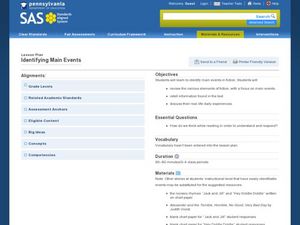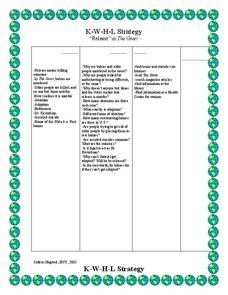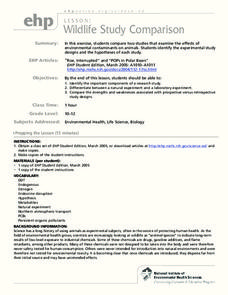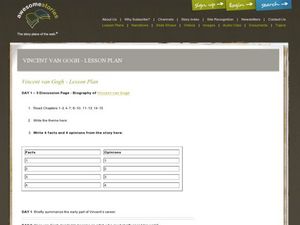Curated OER
Identifying Main Events
Help kindergartners learn to identify the main events in fiction. They will review elements of fiction, retell information found in the text, and discuss their real-life daily experiences. All the while, they will be asking themselves...
Curated OER
The Giver: K-W-H-L Strategy
Explore the theme of release and death in Lois Lowry's The Giver with a K-W-H-L chart. After noting what they already know, kids come up with a list of questions about topics that they would like to know about, as well as how they will...
Novelinks
The Tempest: A-Z Book Project
Create a picture dictionary for one of William Shakespeare's most famous plays. After readers finish The Tempest, they assign each letter of the alphabet to a concept or character, and add a description and evidence from the text to the...
Houghton Mifflin Harcourt
Person to Person: Extra Support Lessons (Theme 4)
Authors use many strategies when writing stories. A series of extra support lessons breaks down those strategies, as well as key grammatical and phonics-based concepts to support struggling learners. The last of three lessons offers...
Curated OER
The Nobel Prize in Chemistry 2003 - Information for the Public
An information-packed eight-page article detailing the history of understanding active transport across cell membranes makes up the bulk of this handout. Two pages of reading comprehension and critical-thinking questions follow. The...
Curated OER
In Legal Limbo
Newspapers are great learning tools. They act as a conduit for current events, reading comprehension, and critical thinking. Here, pupils read a New York Times article regarding US immigration law under the Obama administration and...
Simon & Schuster
Classroom Activities for The Count of Monte Cristo by Alexandre Dumas
Alexandre Dumas' The Count of Monte Cristo is the featured text in three classroom activities. The first activity asks readers to analyze the description of Edmond Dantes in Chapter XVII, paying particular attention to Dumas' word choice...
Newseum
Battle for the Bill of Rights: Ultimate Survivor Amendment Game
To understand the importance of the wording of the articles of the First Amendment (freedom of religion, freedom of speech and the press, and freedom to assembly and petition), teams argue before a jury for draft amendments of one...
Curated OER
Foreign Economics
Why do so many countries export cars? Economists examine this and other foreign economics principles through this introductory learning exercise. A brief text explains international trade, then lists the top 11 leaders in global trade,...
Curated OER
Wildlife Study Comparison
Environmental science classes read articles about two different scientific studies. One is about the effects of contraceptive chemicals on fertility, and the other is about how a pesticide may be reducing bone density in exposed...
Curated OER
Awesome Stories: Vincent van Gogh
Who was Vincent van Gogh? Most of the questions can be answered in two or three sentences; however, there is at least one essay prompt and one personal response question that require longer answers. Questions call for a good mix of...
Curated OER
AP: Chapter 24: The Origin of Species
AP biology buffs define vocabulary terms and answer critical-thinking questions about evolutionary trends. They compare macroevolution to microevolution, differentiate ploidy possibilities, explain isolation barriers, and more....
Curated OER
Thomas Hunt Morgan and the White-Eyed Mutant
Find any article about the genetic research of Thomas Hunt Morgan on the sex-linked eye color trait in Drosophila melanogaster. After having your class read the selection, they can answer these eight critical-thinking questions. This is...
Curated OER
The Arab-Israeli Conflict
Provide your class with a context and series of events that has led to the conflict in the Middle East. They read 4 separate passages and answer 1 critical thinking question for each. Four more questions are posed at the bottom of the...
Curated OER
The Economienda System
Explore the Economienda System common in Latin America during the 1700s. The class will read the included text, answer 3 critical-thinking questions, and fill out a pie chart showing the demographics of the time. They will learn about...
Curated OER
Focus on Economic Data: US Real GDP Growth, August 26, 2011
Young economists answer a series of critical thinking questions as they analyze real data that shows GDP Growth. They examine the provided charts, read through the background information, and discuss changes that occurred in the third...
K12 Reader
Working with Adverbs
Encourage critical thinking with a grammar exercise that focuses on adverbs and adverbial phrases. Kids read the first parts of 16 sentences, then decide which question to answer (how, how much, where, or when) based on the context, and...
Media Smarts
Unit Two: Celebrities and World Issues
Develop media smarts by considering the power of celebrity involvement in world issues. A look at the work of such celebrities as Angelina Jolie, Oprah, and Bono prepare learners to develop their own media campaign for a global...
Media Smarts
Violence and Video Games
Widespread video gaming makes this content relevant and high interest. Developing youth awareness about the impact of violence in games is important to promote literacy, critical thinking, health, and consumer awareness. After reading...
Thoughtful Learning
Creating a Growth Mindset
A quick mimi-lesson models how to replace a fixed mindset with a growth mindset, a mindset that says improvement is possible with practice. Included is an activity that asks individuals to rewrite 10 fixed mindset statements with 10...
Teaching for Change
Selma in Pictures: Socratic Seminar
Photographs from the freedom movement in Selma, Alabama serve as the basis of two Socratic Seminars. Class members prepare for the seminars by closely observing the images, form a hypothesis, and use evidence from photo to support a...
Nemours KidsHealth
Food Safety: Grades 9-12
Food poisoning, salmonellosis, E. Coli, shigellosis, tapeworms—all these words can strike fear into eaters. Alas, the five-second rule is not necessarily true! Two activities teach teens safety rules for food purchasing, preparation,...
Nemours KidsHealth
Media Literacy and Health: Grades 9-12
An essential skill for 21st-century learners is to know how to find reliable sources of information. Two activities help high schoolers learn how to determine the reliability of health-related news from websites, TV, magazines, or...
Teaching Tolerance
Where We Stand
Everyone is entitled to their own opinion. Academics learn strategies to share their opinions and agree or disagree with others in a respectful manner. The resource provides scenarios to help individuals form opinions and share them with...

























